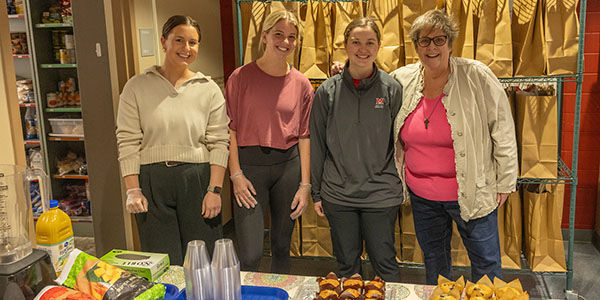EHS funds three experiential learning projects bridging academic disciplines
The initiatives prepare students for real-world collaboration across mental health, education, and nutrition fields

EHS funds three experiential learning projects bridging academic disciplines
“By breaking down academic silos, the projects reflect real-world, team-based models used across education, health, and social services,” said Amity Noltemeyer, dean of EHS. “Interdisciplinary, hands-on learning bridges the gap between theory and practice, preparing students to effectively collaborate across disciplines to address professional challenges.”
Nancy Parkinson, senior clinical lecturer of Kinesiology, Nutrition, and Health, is expanding the current “Culinary Nutrition Depot Interprofessional Collaborations” initiatives. Parkinson has run these initiatives – Weekly Lunch and Learn Events, the Online Food Pantry Pick List Program, and Monthly Monday Meals – for the past three years with the goal of addressing nutrition security and providing collaborative learning opportunities among students, helping them to gain an understanding of how nutrition intersects with other fields. Using the internal grant, Parkinson plans to incorporate students from the Department of Sport Leadership and Management, the Department of Psychology, the Department of Family Science and Social Work, and other disciplines like education and nursing into the initiatives.
Bryn Beeder, a visiting instructor working with Parkinson on the project, said, “It’s hopefully going to set a precedent to collaborate. … The start is here in EHS. Part of being a professional is learning what other people are doing.”
Associate clinical professor of Educational Psychology Jenna Alvarez’s project, “Miami Interprofessional Training Teams (MIPTTs) for Future Mental Health Professionals,” plans to create interdisciplinary training teams for master's students in the School Psychology program and students in the new Counselor Education program, specializing in either Clinical Mental Health Counseling and School Counseling.
Drawing from various interdisciplinary frameworks, the project is an opportunity to pilot the MIPTTs model in conjunction with the Counselor Education program, School Psychology program, and the Office of Student Wellness to serve underserved populations. This collaboration aims to boost knowledge and awareness of different mental health roles within schools. By tapping into each other's strengths, participants can reduce burnout, increase mental health services and support for students, minimize mental health crises, and potentially improve job placements.
“We want to work closely with the Office of Student Wellness to expose undergraduate students to these training models. So often what happens is there’s so many different mental health graduate programs, pathways, careers… it can be overwhelming,” Alvarez said. The hope, she added, is to foster undergraduates students to pursue a career in the mental health professions by having them observe real case presentations.
The “Interprofessional Symposium on School-Based Mental Health and Social-Emotional Behavioral Supports” project proposed by Briana von Mizener, assistant clinical professor of Educational Psychology, will implement a new student-led professional development symposium focused on social-emotional and behavioral supports for K-12 students. It’s designed to foster collaboration among students from the School Psychology program, the Educational Psychology Inclusive Special Education program, and the Department of Family Science and Social Work.
“School-based professionals are often called on to address the social and emotional needs of students. To do that, it is critical they interact collaboratively with other professional disciplines to provide the best interventions for the student,” von Mizener said. “We want our pre-professional students to enter the workforce with a collaborative mindset and an understanding of the other roles that school-based professionals play in the mental and behavioral health of students.”